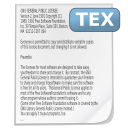Reconocimiento y Clasificación de Mensajes de Odio
Resumen
El uso masivo de las redes sociales y el anonimato que este brinda ha posibilitado no solamente la comunicación inmediata entre los usuarios, sino también que acrezca la difusión del discurso de odio contra ciertos grupos de nuestra sociedad en forma de mensajes ofensivos para ellos, esto ha desembocado en un grave problema social; el cual sigue siendo tema de investigación actual junto con NLP. El propósito del presente trabajo es hacer una comparación de nuestro modelo de reconocimiento de "HateCheck" contra los resultados del autor, utilizando la misma base de datos que ellos. Para ello haremos uso de las principales métricas como son: precisión, recall y F1.
Descargas
Citas
G. Eason, B. Noble, and I. N. Sneddon, “On certain integrals of Lipschitz-Hankel type involving products of Bessel functions,” Phil. Trans. Roy. Soc. London, vol. A247, pp. 529–551, April 1955. DOI: https://doi.org/10.1098/rsta.1955.0005
VAN AKEN, Betty, et al., “Challenges for toxic comment classification: An in-depth error analysis“, 2018. DOI: https://doi.org/10.18653/v1/W18-5105
BANKO, Michele; MACKEEN, Brendon, “RAY, Laurie. A unified taxonomy of harmful content. En Proceedings of the fourth workshop on online abuse and harms“, 2020, p. 125-137. DOI: https://doi.org/10.18653/v1/2020.alw-1.16
PLAZA-DEL-ARCO, Flor Miriam, et al. “Comparing pretrained language models for Spanish hate speech detection. Expert Systems with Applications“, 2021, vol. 166, p. 114120. DOI: https://doi.org/10.1016/j.eswa.2020.114120
Thomas Davidson, Dana Warmsley, Michael Macy and Ingmar Weber “Automated hate speech detection and the problem of offensive languaje“. In Proceedings of the 11th International AAAI Conference on Web and Social Media, 2017, p. 512-515 DOI: https://doi.org/10.1609/icwsm.v11i1.14955
Alexis Palmer, Christine Carr, Melissa Robinson, Jordan Sanders. “COLD: Annotation scheme and evaluation data set for complex offensive language in English“, Journal for Language Technology and Computational Linguistics, p. 1-28.
Alexis Palmer, Christine Carr, Melissa Robinson, Jordan Sanders. “COLD: Annotation scheme and evaluation data set for complex offensive language in English“, Journal for Language Technology and Computational Linguistics, p. 1-28.
B. Lohitha, M. V and J. J. Amarnath, "A Comparison of Different Models for the Detection of Hate Speech," 2022 1st International Conference on Computational Science and Technology (ICCST), CHENNAI, India, 2022, pp. 492-496, doi: 10.1109/ICCST55948.2022.10040400. DOI: https://doi.org/10.1109/ICCST55948.2022.10040400
RÖTTGER, Paul, et al. HateCheck: Functional tests for hate speech detection models. arXiv preprint arXiv:2012.15606, 2020. DOI: https://doi.org/10.18653/v1/2021.acl-long.4
BALKIR, Esma, et al. Necessity and sufficiency for explaining text classifiers: A case study in hate speech detection. arXiv preprint arXiv:2205.03302, 2022. DOI: https://doi.org/10.18653/v1/2022.naacl-main.192
OTTER, Daniel W.; MEDINA, Julian R.; KALITA, Jugal K. A survey of the usages of deep learning for natural language processing. IEEE transactions on neural networks and learning systems, 2020, vol. 32, no 2, p. 604-624. DOI: https://doi.org/10.1109/TNNLS.2020.2979670
WU, Stephen, et al. Deep learning in clinical natural language processing: a methodical review. Journal of the American Medical Informatics Association, 2020, vol. 27, no 3, p. 457-470. DOI: https://doi.org/10.1093/jamia/ocz200
SHISHAH, Wesam; FAJRI, Ricky Maulana. Large Comparative Study of Recent Computational Approach in Automatic Hate Speech Detection. TEM Journal, 2022, vol. 11, no 1, p. 82. DOI: https://doi.org/10.18421/TEM111-10
PÉREZ, Juan Manuel, et al. Assessing the impact of contextual information in hate speech detection. IEEE Access, 2023, vol. 11, p. 30575-30590. DOI: https://doi.org/10.1109/ACCESS.2023.3258973
RÖTTGER, Paul, et al. MULTILINGUAL HATECHECK: Functional Tests for Multilingual Hate Speech Detection Models. arXiv preprint arXiv:2206.09917, 2022. DOI: https://doi.org/10.18653/v1/2022.woah-1.15
ABRO, Sindhu, et al. Automatic hate speech detection using machine learning: A comparative study. International Journal of Advanced Computer Science and Applications, 2020, vol. 11, no 8. DOI: https://doi.org/10.14569/IJACSA.2020.0110861
- Conceptualización
- Curación de datos
- Análisis formal
- Investigación
- Metodología
- Software
- Validación
- Visualización
- Redacción - borrador original
- Escritura, revisión y edición
- Conceptualización
- Curación de datos
- Análisis formal
- Investigación
- Metodología
- Software
- Validación
- Visualización
- Redacción - borrador original
- Escritura, revisión y edición
- Conceptualización
- Curación de datos
- Análisis formal
- Investigación
- Metodología
- Software
- Validación
- Visualización
- Redacción - borrador original
- Escritura, revisión y edición
Derechos de autor 2023 Innovación y Software

Esta obra está bajo licencia internacional Creative Commons Reconocimiento 4.0.
Los autores ceden en exclusiva el derecho de publicación de su artículo a la Revista Innovación y Software, que podrá editar o modificar formalmente el texto aprobado para cumplir con las normas editoriales propias y con los estándares gramaticales universales, antes de su publicación; asimismo, nuestra revista podrá traducir los manuscritos aprobados a cuantos idiomas considere necesario y difundirlos en varios países, dándole siempre el reconocimiento público al autor o autores de la investigación.
























